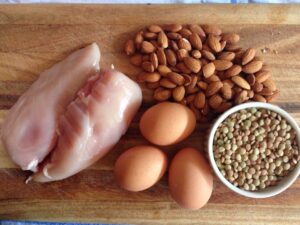Do you have a little bit of extra weight around your midsection that you just can’t seem to get rid of? You’re not alone. A lot of people struggle with belly fat, and it can be tough to lose. But don’t worry, we’re here to help! In this blog post, we will discuss 6 proven ways to reduce belly fat and get the slim, and slender waistline that you’ve always wanted!
Contents
Reduce Belly Fat
Here are 6 ways by which you can reduce your belly fat:
Increase Your Protein Intake
 Eating more protein is one of the most effective ways to reduce belly fat. Protein helps keep you full for longer and burns more calories during digestion than other macronutrients like carbohydrates or fats.
Eating more protein is one of the most effective ways to reduce belly fat. Protein helps keep you full for longer and burns more calories during digestion than other macronutrients like carbohydrates or fats.
Studies have shown that high-protein diets can reduce abdominal fat and help maintain weight. One study published in the American Journal of Clinical Nutrition found that people who increased their protein intake to 25% of their daily caloric intake lost nearly 8 pounds in 12 weeks compared to those who ate a lower-protein diet. Additionally, their waist circumference decreased by 3.7 cm on average during the study period.
Here are 10 foods rich in protein:
- Eggs: Eggs are by far one of the most complete and high-quality sources of protein. Just 1 large egg contains 6.3 grams of complete protein – about 13% of your daily needs!
- Lean meats: Chicken, turkey, and beef are all excellent sources of protein. One 3-ounce serving of chicken provides 27 grams of complete protein or 54% of your daily requirement.
- Fish: Salmon, tuna, and other fish are rich in protein and healthy fats. A 3-ounce serving of salmon contains 17 grams of protein.
- Legumes: Beans, lentils, and other legumes are high in fiber and protein. One cup of cooked lentils contains 18 grams of protein.
- Nuts: Almonds, walnuts, and other nuts are a great source of healthy fats and protein. Just 1/4 cup of almonds provides 8 grams of complete protein or 16% of your daily needs.
- Greek yogurt: Greek yogurt is packed with protein and calcium. Just 1 cup of plain Greek yogurt has 17 grams of protein or 34% of your daily needs.
- Seeds: Chia seeds, pumpkin seeds, and other seeds are rich in fiber, vitamins, minerals, and protein. Just 1 ounce of chia seeds contains 4.7 grams of protein or 9% of your daily requirement.
- Quinoa: This ancient grain is a great source of complete protein and is naturally gluten-free. One cup of cooked quinoa contains 8 grams of protein or 16% of your daily requirement.
- Tempeh: This vegetarian protein is made from fermented soybeans and provides a whopping 15 grams of complete protein per half-cup.
- Tofu: This vegetarian protein is made from soybeans and provides 10 grams of complete protein per half-cup serving.
Reduce Sugary Foods and Drinks
One of the main causes of belly fat is excess sugar consumption. Consuming too much sugar can lead to an increase in body fat, especially around the midsection.
Studies have shown that consuming sugary foods and drinks can increase fat storage in the abdominal area. One study found that people who consumed more than 10% of their daily caloric intake from added sugars had an 8-fold higher risk of developing abdominal obesity compared to those who did not consume added sugars.
Here are 9 tips to reduce your sugar intake:
- Read food labels: Whenever you buy packaged foods, be sure to read the nutrition labels. Look for added sugars in the ingredients list and check how many grams of sugar are in each serving.
- Choose whole foods: The best way to reduce your sugar intake is to choose whole, unprocessed foods such as fruits, vegetables, lean proteins, and whole grains.
- Avoid processed foods: Processed foods such as cookies, cakes, candy bars, and chips are often packed with added sugar. Limit these foods as much as possible and opt for healthier alternatives instead.
- Avoid sugary drinks: Sugary drinks such as soda, energy drinks, and sweetened coffee and tea can be loaded with added sugars. Stick to water or unsweetened beverages instead.
- Reduce added sugars: Reduce the amount of added sugars you use in recipes or when baking. You can also opt for natural sweeteners such as honey or pure maple syrup instead.
- Choose unsweetened versions: Unsweetened versions of foods such as yogurt, cereal, and oatmeal are much lower in sugar than their sweetened counterparts.
- Replace sugary snacks with fruit: Instead of reaching for a sugary snack, opt for fruit. Fruits are naturally sweet and much lower in sugar than processed snacks.
- Eat mindfully: Be mindful of how much sugar you consume. Try to limit added sugars as much as possible and don’t forget to count the sugars found in whole foods.
- Satisfy your sweet tooth with natural sweetness: Natural sweetness can be found in many healthier alternatives to processed snacks. Try adding some berries to your oatmeal or a drizzle of honey on your yogurt.
Get More Fiber
 Fiber is an important nutrient that helps keep you full and promotes digestive health. Studies have shown that increasing your fiber intake can help reduce belly fat.
Fiber is an important nutrient that helps keep you full and promotes digestive health. Studies have shown that increasing your fiber intake can help reduce belly fat.
One study published in the Journal of Nutrition found that people who consumed more dietary fiber had lower body weight, waist circumference, and visceral fat. Furthermore, consuming more fiber was associated with a lower risk of developing abdominal obesity.
Here are some tips to increase your fiber intake:
- Eat whole grains: Whole grains are an excellent source of fiber. Try to incorporate more whole-grain foods such as quinoa, oats, and brown rice into your diet. Just 1/2 cup of uncooked quinoa provides 8 grams of fiber!
- Add beans and legumes: Beans and legumes are also a great source of fiber. Try adding a cup of black beans or chickpeas to your salads and soups. Just 1 cup of cooked chickpeas provides 12 grams of fiber!
- Eat more fruits and vegetables: Fruits and vegetables are also packed with fiber. Apples, oranges, pears, and berries are all great sources of fiber. Aim for at least 5 servings of fruits and vegetables each day. Just 1 cup of strawberries contains 3 grams of fiber!
- Choose high-fiber snacks: Many snack foods are packed with fiber. Try snacking on popcorn, whole-grain crackers, and nuts. Just 1/4 cup of almonds provides 4 grams of fiber!
- Add flaxseed and hemp hearts: Flaxseed and hemp hearts are packed with fiber. Add them to your yogurt, oatmeal, smoothies, or salads. Just 1 tablespoon of flaxseed contains 3 grams of fiber!
- Read nutrition labels: Nutrition labels can help you find out how much fiber is in a particular food. Look for foods that contain at least 3 grams of fiber per serving.
- Enjoy occasional treats: While it is important to limit processed and sugary foods, it is OK to enjoy occasional treats. Just be mindful of portion sizes and try to stick to foods that are low in sugar and high in fiber.
Get Enough Sleep
Getting enough quality sleep is essential for overall health and well-being. Studies have shown that not getting enough sleep can lead to weight gain and an increase in belly fat.
Several studies have found that getting 7-8 hours of sleep per night can help reduce belly fat. One study published in the American Journal of Epidemiology found that people who slept fewer than 6 hours per night had an increased risk of abdominal obesity. Moreover, getting adequate sleep was associated with a lower risk of developing abdominal obesity.
Here are 9 tips to help you get enough quality sleep:
- Establish a bedtime routine: Routines can help you relax and prepare for sleep. Try to stick to the same bedtime and wake-up time every day.
- Avoid caffeine and alcohol: Caffeine and alcohol can interfere with sleep. Try to avoid them in the evening and at least 6 hours before bedtime.
- Avoid large meals: Eating a large meal close to bedtime can interfere with sleep. Try to eat dinner at least 3 hours before bedtime.
- Limit screen time: The blue light from screens can disrupt your sleep-wake cycle. Try to avoid looking at screens for at least an hour before bedtime.
- Create a comfortable sleep environment: A comfortable sleep environment can help you get to sleep and stay asleep. Make sure your bedroom is dark, quiet, and cool.
- Take a hot bath or shower: Taking a hot bath or shower can help relax your body and prepare you for sleep.
- Try meditation: Meditation has been shown to help improve sleep quality. Try meditating for 10 minutes before bedtime.
- Practice deep breathing exercises: Deep breathing exercises can help calm your mind and body. Try taking a few deep breaths when you feel yourself getting anxious or stressed.
- Talk to your doctor: If you are having difficulty sleeping, talk to your doctor. They may be able to recommend treatments or medications that can help you get a better night’s sleep.
Eat A Balanced Diet
 Eating a balanced diet is essential for good health. Eating a balanced diet can help you get the nutrients your body needs to stay healthy and strong. A balanced diet includes eating a variety of foods from each food group, in the right proportions.
Eating a balanced diet is essential for good health. Eating a balanced diet can help you get the nutrients your body needs to stay healthy and strong. A balanced diet includes eating a variety of foods from each food group, in the right proportions.
Studies have shown that eating a balanced diet can help reduce your risk of developing chronic diseases. Eating a balanced diet can also help you maintain a healthy weight.
Here are 10 tips to help you eat a balanced diet:
- Eat plenty of fruits and vegetables: Fruits and vegetables are an important part of a balanced diet. Aim to eat at least 5 servings of fruits and vegetables per day.
- Choose whole grains: Whole grains are an excellent source of fiber and other important nutrients. Try to replace refined grains with whole grains, such as oats, brown rice, and quinoa.
- Limit processed and sugary foods: Processed foods are often high in added sugars, salt, and fat. Try to limit your intake of these types of foods.
- Eat lean proteins: Eating lean proteins can help keep you full and provide your body with essential nutrients. Choose lean proteins, such as chicken, fish, beans, or lentils.
- Eat healthy fats: Healthy fats, such as olive oil and avocado, can help keep you full and provide your body with essential fatty acids. Aim to get most of your fats from sources such as nuts and seeds.
- Drink plenty of water: Staying hydrated is essential for good health. Aim to drink at least 8 glasses of water per day.
- Limit alcohol consumption: Drinking too much alcohol can have negative effects on your health. Try to limit your alcohol consumption to no more than 2 drinks per day for men and 1 drink per day for women.
- Choose low-fat dairy products: Dairy products are an important source of calcium and other essential nutrients. Choose low-fat versions, such as skim milk and low-fat yogurt.
- Be mindful of portion sizes: Eating too much can lead to weight gain. Try to be mindful of your portion sizes, and avoid overeating.
- Enjoy treats in moderation: It’s ok to indulge in treats from time to time. Just make sure that you’re not overdoing it, and that you’re still eating a balanced diet.
Exercise regularly
Exercising regularly is essential for good health. Regular physical activity can help you maintain a healthy weight, reduce your risk of chronic diseases, and boost your mood.
Studies have shown that exercising for at least 30 minutes per day, 5 days per week can help you reap the benefits of physical activity. One study even found that just 10 minutes of light exercise per day can have positive effects on your health.
Here are 10 tips to help you get more exercise:
- Set attainable goals: Setting realistic goals can help you stay motivated and on track with your fitness plan. Make sure your goals are specific, measurable, achievable, relevant, and timely (SMART).
- Try something new: Doing the same type of exercise over and over again can become tiresome. Try adding some variety to your routine by trying a new activity or class.
- Schedule it: Making time for exercise is essential if you want to stick to your fitness plan. Put it in your calendar just like you would any important appointment.
- Incorporate movement throughout the day: You don’t have to set aside a huge chunk of time for exercise every day. Try to incorporate physical activity into your daily routine, such as taking the stairs instead of the elevator or going for a quick walk during lunchtime.
- Find an accountability partner: An accountability partner can help keep you motivated and on track with your fitness goals. Find someone willing to help you stay accountable by checking in on your weekly progress.
- Make it enjoyable: If you don’t enjoy an activity, it can be hard to stay motivated. Find activities that you actually enjoy doing and make them part of your exercise routine.
- Celebrate small successes: Celebrating small victories can help keep you motivated and on track with your fitness plan. Give yourself a pat on the back each time you reach one of your goals.
- Try different types of exercise: Variety is key when it comes to staying active and enjoying physical activity. Don’t be afraid to try new things or mix up your routine from time to time.
- Take breaks: Taking regular breaks from exercise can help prevent burnout and injury. Listen to your body and take some time to rest when needed.
- Stay consistent: Consistency is key if you want to stick with your fitness plan. Aim to exercise regularly, even if it’s just for a few minutes each day.
These tips can help you make physical activity part of your daily routine—and reap the benefits of regular exercise. So take the time to make physical activity part of your daily routine, and enjoy the reward
Conclusion
Adopting a healthy lifestyle can help you look and feel your best. Eating a balanced diet, getting regular exercise, and limiting alcohol consumption are key components of living a healthy life. Taking the time to make smart choices now can help you enjoy better health in the future.
Consider contacting FitMantra for additional information on nutrition and fitness. You can also get in touch with their nutrition experts through our online nutrition counseling, who can guide you through the process and help you achieve your fitness goals. You can also lose weight with the help of our weight loss program. Download our Fitness app on Android to learn more about us.
